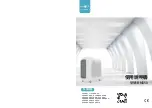
3
1.2. During operation
Caution:
• Do not use any sharp object to push the buttons, as this may damage
the remote controller.
• Do not twist or tug on the remote controller cord as this may damage
the remote controller and cause malfunction.
• Never remove the upper case of the remote controller. It is dangerous
to remove the upper case of the remote controller and touch the
printed circuit boards inside. Doing so can result in fire and failure.
• Never wipe the remote controller with benzene, thinner, chemical rags,
etc. Doing so can result in discoloration and failure. To remove heavy
stains, soak a cloth in neutral detergent mixed with water, wring it out
thoroughly, wipe the stains off, and wipe again with a dry cloth.
• Never block or cover the indoor or outdoor unit’s intakes or outlets.
Tall items of furniture underneath the indoor unit, or bulky items such
as large boxes placed close to the outdoor unit will reduce the unit’s
efficiency.
Warning:
• Do not splash water over the unit and do not touch the unit with wet
hands. An electric shock may result.
• Do not spray combustible gas close to the unit. Fire may result.
• Do not place a gas heater or any other open-flame appliance where
it will be exposed to the air discharged from the unit. Incomplete
combustion may result.
Warning:
• Do not remove the front panel or the fan guard from the outdoor unit
when it is running. You could be injured if you touch rotating, hot or
high-voltage parts.
• Never insert fingers, sticks etc. into the intakes or outlets, otherwise
injury may result, since the fan inside the unit rotates at high speed.
Exercise particular care when children are present.
• If you detect odd smells, stop using the unit, turn off the power switch
and consult your dealer. Otherwise, a breakdown, electric shock or fire
may result.
• When you notice exceptionally abnormal noise or vibration, stop
operation, turn off the power switch, and contact your dealer.
• Do not over-cool. The most suitable inside temperature is one that is
within 9° F of the outside temperature.
• Do not leave handicapped people or infants sitting or standing in the
path of the airflow from the air-conditioner. This could cause health
problems.
Caution:
• Do not direct the airflow at plants or caged pets.
• Ventilate the room frequently. If the unit is operated continuously in a
closed room for a long period of time, the air will become stale.
In case of failure
Warning:
• Do not repair the air conditioner yourself. Consult your dealer for any
repair or service. Improper repair work can result in water leakage,
electric shock, fire, etc.
• If the remote controller displays an error indication, the air conditioner
does not run, or there is any abnormality, stop operation and contact
your dealer. Leaving the unit as it is under such conditions can result
in fire or failure.
• If the power breaker is frequently activated, get in touch with your
dealer. Leaving it as it is can result in fire or failure.
• If the refrigeration gas blows out or leaks, stop the operation of the
air conditioner, thoroughly ventilate the room, and contact your
dealer. Leaving the unit as it is can result in accidents due to oxygen
deficiency.
When the air conditioner is not to be used for a long
time
• If the air conditioner is not to be used for a long time due to a seasonal
change, etc., run it for 4 - 5 hours with the air blowing until the inside is
completely dry. Failing to do so can result in the growth of unhygienic,
unhealthy mold in scattered areas throughout the room.
• When it is not to be used for an extended time, keep the [power supply]
turned OFF.
If the power supply is kept on, energy will be wasted. Also, the
accumulation of dust, etc., can result in fire.
• Keep the power switched ON for more than 12 hours before starting
operation. Do not turn the power supply OFF during seasons of heavy
use. Doing so can result in failure.
1.3. Disposing of the unit
Warning:
When you need to dispose of the unit, consult your dealer. If pipes are
removed incorrectly, refrigerant (fluorocarbon gas) may blow out and
come into
contact with your skin, causing injury. Releasing refrigerant into the atmo-
sphere also damages the environment.




































